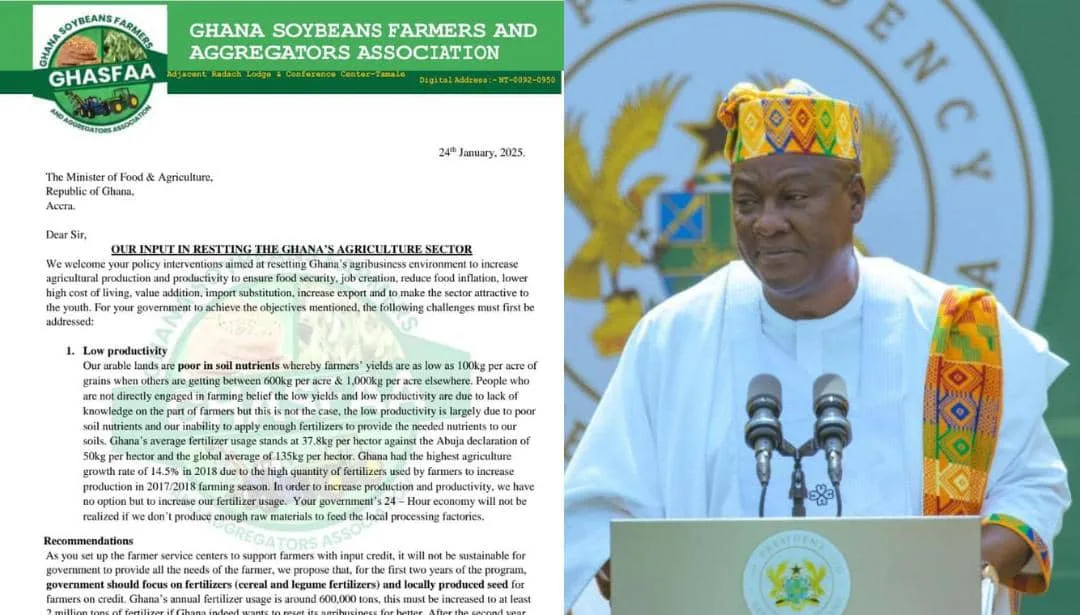The Ghana Soybeans Farmers and Aggregation Association (GHASFAA) has called on the government to implement several measures to boost the agricultural sector and ensure food security in the country.
According to GHASFAA, the government’s policy interventions aimed at resetting Ghana’s agribusiness environment are welcome, but certain challenges must be addressed to achieve the desired objectives.
Some of the challenges identified by GHASFAA include low productivity, unfettered access to market for locally produced agricultural commodities, high cost of poultry feed, imported grains competing against local grains, and the need for irrigation facilities.
To address these challenges, GHASFAA has proposed several recommendations, including increasing fertilizer usage, creating a platform for local processing factories to access grains from the Buffer Stock Company, and imposing a tax on imported grains.
GHASFAA has also called on the government to prioritize made-in-Ghana goods and initiate a campaign to promote local consumption.
The potential impact of these proposals includes ensuring food security, providing ready and affordable raw materials for local processing factories, making the 24-Hour economy a reality, sustainable employment creation, increased exportation, reduced importation, and reduced dependency on foreign currencies.
Read the full statement below
OUR INPUT IN RESTTING THE GHANA’S AGRICULTURE SECTOR
Ghana Soybeans Farmers and Aggregation Association (GHASFAA)
We welcome your policy interventions aimed at resetting Ghana’s agribusiness environment to increase agricultural production and productivity to ensure food security, job creation, reduce food inflation, lower high cost of living, value addition, import substitution, increase export and to make the sector attractive to the youth. For your government to achieve the objectives mentioned, the following challenges must first be addressed:
1. Low productivity
Our arable lands are poor in soil nutrients whereby farmers’ yields are as low as 100kg per acre of grains when others are getting between 600kg per acre & 1,000kg per acre elsewhere. People who are not directly engaged in farming belief the low yields and low productivity are due to lack of knowledge on the part of farmers but this is not the case, the low productivity is largely due to poor soil nutrients and our inability to apply enough fertilizers to provide the needed nutrients to our soils. Ghana’s average fertilizer usage stands at 37.8kg per hector against the Abuja declaration of 50kg per hector and the global average of 135kg per hector. Ghana had the highest agriculture growth rate of 14.5% in 2018 due to the high quantity of fertilizers used by farmers to increase production in 2017/2018 farming season. In order to increase production and productivity, we have no option but to increase our fertilizer usage. Your government’s 24 – Hour economy will not be realized if we don’t produce enough raw materials to feed the local processing factories.
Recommendations
As you set up the farmer service centers to support farmers with input credit, it will not be sustainable for government to provide all the needs of the farmer, we propose that, for the first two years of the program, government should focus on fertilizers (cereal and legume fertilizers) and locally produced seed for farmers on credit. Ghana’s annual fertilizer usage is around 600,000 tons, this must be increased to at least 2 million tons of fertilizer if Ghana indeed wants to reset its agribusiness for better. After the second year of your administration, production would have been improved and burden on farmers would have been reduced based on the initial investments on fertilizer and seed, this would have paved the way for bringing on farm machinery to complement the initial investment of fertilizer and seed. In sustaining the farmer service center, there is the need for linking value chain actors such as input dealers, farmer service centers,
out growers/aggregators, farmers, the National Food Buffer Stock Company, local processing factories, poultry farmers, public institutions in need of grains and exporters.
Fertilizer financing programs
a. Providing free fertilizers to farmers is not sustainable and we call on government to abandon the idea.
b. Fertilizer subsidy programs have been misused by government officials in the past for political patronage, if government can find a way for subsidized fertilizers to reach the real farmers, we are all for it.
c. Sustainable fertilizer financing: we are of the view that, in sustaining fertilizer financing for farmers, there is the need for government to remove all taxes and levies on fertilizer import and production in order to reduce the prices for farmers.
d. Fertilizer grants: female smallholder farmers have been identified as the most vulnerable farmers and we proposed any fertilizer grant for farmers should first go to the female smallholder farmers before extending it to any other category of farmers.
2. Unfettered access to market for locally agricultural commodities:
a. The export and import restriction of grains regulation 2022 (L.I. 2467) which ministers have been using to place ban on export of soybeans to their selfish interest must be repealed to open up the soybean market and this will attract more investors and farmers into the sector. The aim of this law was to make soybeans available for the local processing factories but upon several years of banning the export of the commodity, none of these local processing factories are able to buy soybeans from
farmers or aggregators, so the law is of no benefit to the value chain actors, the government and must be repealed immediately.
Problem facing the local processing factories
a. The problem of the local processing factories is the fact that, they don’t have ready cash to buy soybean and make cash payment and not that farmers or aggregators don’t want to sell to them.
b. National Food Buffer Stock Company was set up to mop up grains from farmers in order to provide ready market to Ghanaian farmers and to ensure food security in the country. The company failed because of political patronage. The time is up for Buffer stock company to refocus on its mandate for which it was set up in 2010. We are therefore calling for the collaboration between Buffer stock company and the farmer service center, such that, farmer service center recovers their investment from farmers in a form of commodity and sell to Buffer stock company to keep for the lean season.
In addition, there is the need for government to resources Buffer stock company to be able to buy more grains during the peak season and sell during the lean season. If government position Buffer stock company well, the company will be able to be independent of government support within three years of operations. We also call on government to create a platform, where local processing factories, government institutions and other value chain actors will be able to get easy access to grains from the Buffer stock company and this will go a long way to boosting your government’s value addition, import substitution and the 24-Hour economy agendas.
3. High cost of poultry feed
The major challenge in the poultry industry is high cost of feed which accounts for 70% of production cost. Countries where poultry farming is doing well feed their birds with GM soybean and maize which are less costly compare to conventional soybean and maize. In Ghana, the reverse is used and its one of the reasons the poultry feed is expensive in the country leading to the collapse of the industry. Conventional feed is expensive and we cannot be feeding our birds with expensive feed and still be competitive, hence the need to produce local GM soybean and maize at least for the poultry industry.
4. Imported grains competing against local grains
The grain sector is also faced with competition from imported grains. Currently, local rice is the major victim and if Ghana doesn’t act to reverse the trend, it would be extended to the maize and soybean sectors, where we will be changing more cedi to import maize and soybean in addition to rice. No matter the amount of support provided to the grain industry without accompanied ready market for the local grains, there will be no impact. In the light of this, we propose a tax imposition on imported grains that are produced here, at least10% tax on every kilogram of grain imported outside AfCFTA such as rice etc. The tax will help in slowing down the import which will increase demand for the local grains and this is expected to reduce pressure on the cedi. We further propose the taxes are used to buy more fertilizers to increase the local production. This is in line with your government’s agenda of “feed Ghana program to ensure food security, lower food inflation, boost local food production and consumption”.
5. Setting up Agro Industrial Zones in all Regions
There are hundreds of factories engaged in agro processing in Ghana, most of these factories are processing below capacity and others have become dormant due to unavailability of raw materials for processing. We are of the view that, instead of establishing new factories that will also face the same challenge of lack of raw materials, government should rather channel the resources in supporting Buffer stock company to buy more raw material from farmers and sell to the existing factories. This will be a sure way of sustaining the agribusiness value chains in the country, sustaining the value chains also comes with sustainable employment creation and import substitution.
6. Irrigation facilities
There are a number of irrigation facilities in the country and we propose in the short term, government create more land banks around those irrigation facilities for farmers to increase rice and vegetable production during the dry season. In the long term government should be working to create additional irrigation facilities and land banks in other areas depending on the need.
7. Development Partners and NGOs
There are a lot of NGOs, development partners and impact investors in the agriculture space whose objectives are mostly not align to the need (seed, fertilizer, tractor service and harvesting service) of farmers in the country. The misalignment of these objectives to the need of farmers resulted in donor, funder and beneficiary farmers’ fatigue. We therefore use this opportunity to call on you to use your high offices to talk to our development partners, NGOs, impact investors etc. to redirect the objectives of their funds to addressing the real need of farmers.
8. Made in Ghana campaign
We call on government as a matter of agency to prioritize made in Ghana goods and initiate a campaign for Ghanaians to see the need in consuming goods made in Ghana.
Potential impact of our proposals
a) Ensure food security in the country.
b) Ready and affordable raw materials for local processing factories.
c) Making the 24 – Hour economy a reality.
d) Sustainable employment creation.
e) Increased exportation.
f) Reduced importation.
g) Reduced dependency on foreign currencies, there by strengthening the Ghanaian cedi.
Signed:
Abdul-Hakeem Issah
(Director of Administration, GHASFAA)
Fuseini Stephen Awiniboya
(Director of Communication, GHASFAA)
Mumuni Ayiga Abdul Rahman
(Director of Agronomy, GHASFAA)
Amidu Walker
(Director of marketing, GHASFAA)
Abdul Moonin Abass
(Director of finance, GHASFAA)
Alhaji Abdulai Abdul Rafiw
(Director of value chain, GHASFAA)
Abdulai Alhassan Andrews
(Chairman, GHASFAA)
Click on the link below for more document
Source: TheDailyTrustGh.com



